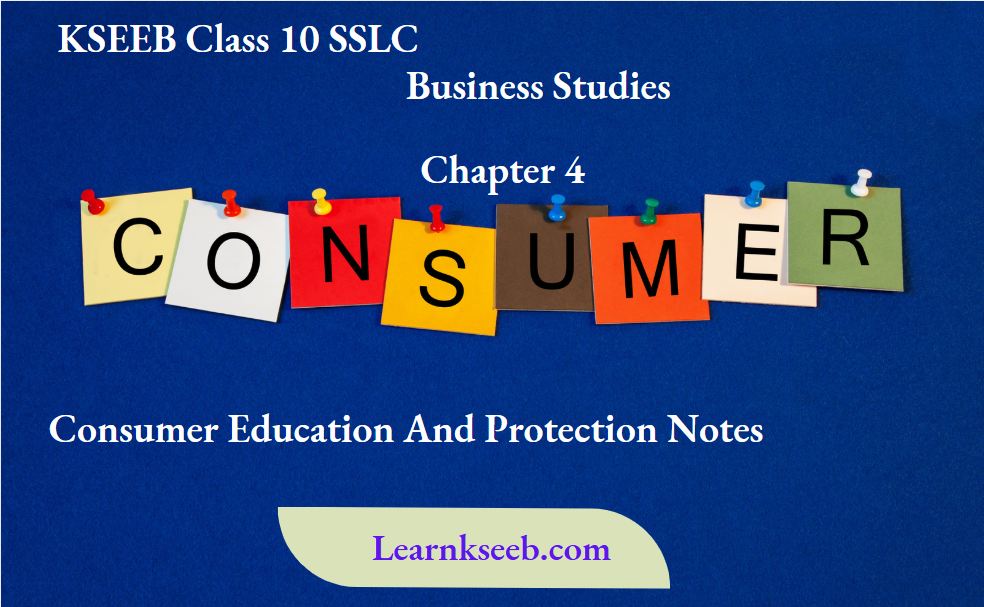KSEEB Class 10 SSLC Business Studies Chapter 4 Consumer Education and Protection Consumer Rights
Meaning of the User and the Provider
- The person who uses the goods and services is called “User”.
- The person who supplies goods and services is called “Provider”.
AWARE: Association of Women Against Rising Expenses.
- Teleshopping : Ordering for the goods through Internet, SMS (short message service) or telephone and paying after receiving the goods at door is called teleshopping.
- Consumer : Consumer is a person who buys goods or hires or avails services for a consideration called price or wages.
- Consumer Protection: To protect the consumers against the exploitation by the procedures and traders.
“KSEEB Class 10 Business Studies Consumer Education and Protection notes”
Consumer Rights: They are as follows:
- The right to information about the quality, quantity, purity and standard of the goods.
- The right to be heard the interests with due consideration.
- Right to consumer education to aware about their rights.
- Right to health environment to lead a quality life.
- Right to protest against the marketing of goods which are hazardous to life and property of the consumers.
Precautionary measures while buying goods and services:
- Check the brand of the product.
- Check the quality of the product.
- Check the actual quantity of the product.
- Check the seal (if possible) of the product.
- Check the ingredient used in the product.
- Consumer Education: Education of consumer or consumer education refers to the awareness of the consumer for their rights.

Consumer Protection Act and Consumer Disputes Redressal Agencies Many steps have been taken by the government to protect the rights of consumer so Consumer Production Act 1986 is a significant step in this direction.
This Act safeguards the interests of the consumers and tries to strives their exploitation.
“SSLC Business Studies Chapter 4 Consumer Education and Protection explained”
Objectives of Consumer Production Act:
- Accords importance for safety and quality.
- Avoiding production and sale of hazardous goods.
- Supervising on quality, weights, measures and price.
- Compensating the consumer in case of any problem arising as a result of trade.
- Creating awareness to the consumers through consumer education.
- Consumer Protection Act extends to the whole of India except Jammu and Kashmir. World Consumers’ Day is celebrated on 15 March, every year.
- Consumer Disputes Redressal Agencies: The Consumer Protection Act provides for the establishment of a three tier consumer disputes redressal agencies:
- District forum
- State commission
- National commission
Name of the Agency
- District forum
- State commission
- National commission
- Composition
- Value of goods
- Two members with atleast one woman Complaints entertain when the value of appointed by the state government. goods or services is less than 20 lakhs.
- Three members with atleast one woman, one Complaints entertained when the value of is or has been a high court judge goods or services is more than 20 lakhs but less than one crore.
- Headed by a Judge of supreme court and four Complaints entertain when the value of other members with atleast one woman. goods or services is more than one crore.
“KSEEB SSLC Consumer Education and Protection chapter summary”
Methods to be followed to file a case in consumer court:
- Complaint may be typed or handwritten as there is no prescribed pro forma to file a case.
- Complaint should include the name of the complainer, full address and contact member.
- The person or organization against whom the complaint is made should be mentioned clearly with address.
- The actual loss of goods should be properly mentioned. Bill or receipt should be enclosed.
- There is no fees or stamp duty for the complaint.
- No advocate or lawyer is resuited. The consumer himself/herself can argue.
Methods to be followed to file a case in consumer court: - Complaint may be typed or handwritten as there is no prescribed pro forma to file a case.
- Complaint should include the name of the complainer, full address and contact member.
- The person or organization against whom the complaint is made should be mentioned clearly with address.
- The actual loss of goods should be properly mentioned. Bill or receipt should be enclosed.
- There is no fees or stamp duty for the complaint.
- No advocate or lawyer is resuited. The consumer himself/herself can argue.
KSEEB SSLC Class 10 Social Science Notes History
- Chapter 1 Advent of Europeans to India Notes
- Chapter 2 The Extension of the British Rule Notes
- Chapter 3 The Impact of British Rule in India Notes
- Chapter 4 Opposition to British Rule in Karnataka Notes
- Chapter 5 Social and Religious Reformation Movements Notes
- Chapter 6 The First War of Indian Independence (1857) Notes
- Chapter 7 Freedom Movement Notes
- Chapter 8 Era of Gandhi and National Movement Notes
- Chapter 9 Post Independent India Notes
- Chapter 10 The Political Developments of 20th Century Notes
KSEEB SSLC Class 10 Social Science Notes Political Science
- Chapter 1 The Problems of India and their Notes
- Chapter 2 Indian Foreign Policy Notes
- Chapter 3 India’s Relationship with Other Countries Notes
- Chapter 4 Global Problems and India’s Role Notes
- Chapter 5 International Institutions Notes
KSEEB SSLC Class 10 Social Science Notes Sociology
- Chapter 1 Social Stratification Notes
- Chapter 2 Labour Notes
- Chapter 3 Social Movements Notes
- Chapter 4 Social Problems Notes
KSEEB SSLC Class 10 Social Science Notes Geography
- Chapter 1 Indian Position and Extension Notes
- Chapter 2 Indian Physiography Notes
- Chapter 3 Indian Climate Notes
- Chapter 4 Indian Soils Notes
- Chapter 5 Indian Forest Resources Notes
- Chapter 6 Indian Water Resources Notes
- Chapter 7 Indian Land Resources Notes
- Chapter 8 Indian Mineral & Power Resources Notes
- Chapter 9 Indian Transport and Communication Notes
- Chapter 10 Indian Industries Notes
- Chapter 11 Indian Natural Disasters Notes
- Chapter 12 Indian Population Notes
KSEEB SSLC Class 10 Social Science Notes Economics
- Chapter 1 Development Notes
- Chapter 2 Rural Development Notes
- Chapter 3 Money and Credit Notes
- Chapter 4 Public Finance and Budget Notes
KSEEB SSLC Class 10 Social Science Notes Business Studies
- Chapter 1 Bank Transactions Notes
- Chapter 2 Entrepreneurship Notes
- Chapter 3 Globalization of Business Notes
